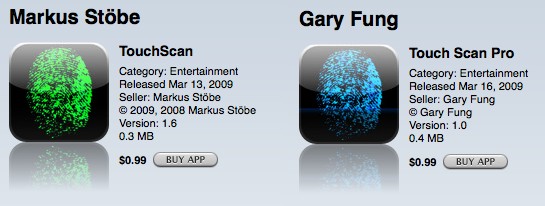The next App Store threat: counterfeit apps

There have been plenty of stories about unscrupulous developers gaming the App Store in hopes of riches, one developer copied the Classics app, right down to the artwork, and posted it for sale in the App Store. Now some ethically-challenged coders have taken it to a whole new level -- counterfeiting apps.
Ars Technica brings to light an even more egregious practice - outright clones of existing apps. Take for example TouchScan and Touch Scan Pro, novelty apps that pretend to "scan" your finger and display witty messages.
Which one is the real deal?
The problem isn't just that these copycats are similar in concept or execution, but that they directly copy artwork, product descriptions, icons, and names, though sometimes the name or artwork is slightly modified. It's relatively trivial to get inside a .ipa bundle and copy the artwork, as in the case of Touch Scan Pro, a nearly identical copy of Touch Scan.
There's another example over at Ars comparing iCopter to Copter Free that's particularly troubling because that seedy chap cloned a paid app and is distributing it away for free. Can you imagine investing your time in the development of an iPhone app only to have someone rip it off and give it away for free?
The problem with this latest threat is that Apple appears to be turning a blind eye to the problem and instead focusing on litigating companies that use the word "pod" in their product names. Apple needs to get its legal priorities together and use its in-house legal council to protect its developers.
